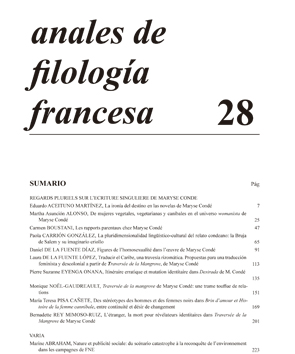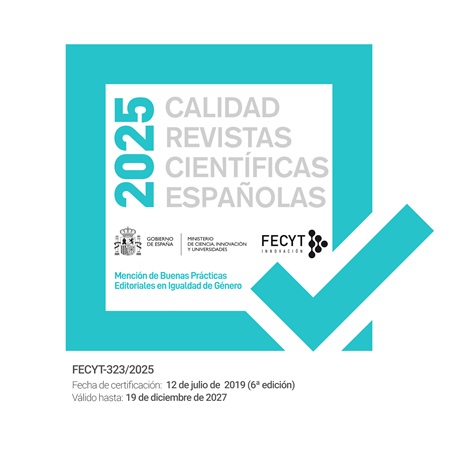Translating the Caribbean, a rhizomatic crossing. Proposals for a feminist and decolonial translation from Maryse Condé's Traversée de la Mangrove
Abstract
For a long time, the Caribbean has witnessed the meeting and clashes between different peoples, which have replanted the fruit of multiple languages and cosmovisions. In this land, resistant voices are emerging that seek to break the epistemological and literary silence that Western hegemony has sought to impose on them, this is the case of Maryse Condé. Within this framework, this article will seek to reflect on the interaction between identity conflicts linked to ethnicity, gender and language, all motivated by the wounds of colonialism, through the example of Traversé de la Mangrove. We have in this text a complex counterpoint in which the oral culture of the ancestors and the written culture of the colonizers are in dialogue, which will pose great translation challenges. Thus, our aim will be to suggest a series of perspectives and useful strategies for undertaking an ethical translation in support of this author's writing project.
Downloads
-
Abstract764
-
PDF (Español (España))428
References
BERNABÉ, Jean, Patrick CHAMOISEAU & Raphaël CONFIANT. 1989. Éloge de la créolité. Paris, Gallimard.
BHABHA, Homi. 1994. The Location of Culture. London / New York, Routledge.
BOGLE, Desrine. 2014. “Traduire la culture créole” in Atelier de traduction (Editura Universităţii din Suceava), n.o 21, 77-92.
CESAIRE ROUSSI, Suzanne. 2015. Le grand camouflage : Écrits de dissidence (1941-1945). Paris, Seuil.
CÉSAIRE, Aimé. 1983. Cahier d’un retour au pays natal. París, Présence Africaine.
CHALI, Jean-Georges. 2017. “Place et rôle des plantes dans l’imaginaire de Maryse Condé : le cas de Tituba sorcière de Salem”, in VertigO - la revue électronique en sciences de l'environnement, vol. 17 nº 3
CHANSON, Philippe. 2005. “Identité et Altérité chez Edouard Glissant et Patrick Chamoiseau, scripteurs visionnaires de la Parole créole”. Recherches Haïtiano-antillaises, n.o 3, 65-89.
CONDÉ, Maryse. 1989. Traversé de la Mangrove. Paris, Mercure de France.
DE SOUSA SANTOS, Boaventura. 2010. Descolonizar el saber, reinventar el poder. Montevideo, Trilce.
DELEUZE, Gilles & GUATTARI Félix. 1978. Kafka: Por una literatura menor. México D.F, Ediciones Era.
FANON, Frantz. 2009. Piel negra, máscaras blancas. Traducido por: Iría Álvarez Moreno, Paloma Monleón Alonso. Madrid, Akal.
FERGUSON, Charles A. 1959. “Diglossia”. WORD nº 15 vol. 2, 325-40.
FERNÁNDEZ, Marcela. 2014. “Feminismo descolonial” in Feminismos y derecho: diversas perspectivas del derecho, del género y la igualdad. Ciudad de México, Centro de Estudios Jurídicos y Sociales Mispat
FOUCAULT, Michel. 1997. “Cours du 7 janvier 1976”. En Il faut défendre la société. Cours au Collège de France. Paris, Gallimard - Seuil.
GLISSANT, Édouard. 1981. Le discours antillais. Paris, Seuil.
GLISSANT, Édouard. 1996. Introduction à une poétique du divers. Paris, Gallimard.
GODAYOL, Pilar. 2000. Espais de frontera. Genere i traducció. Vic, Eumo Editorial.
GODAYOL, Pilar. 2005. “Documentarse para el otro: Traducción / Diferencia / Multiculturalismo” in SALES, Dora (éd.). La Biblioteca de Babel. Documentarse para traducir. Granada, Comares, 67-76.
GUERRA PALMERO, María José (2001) Teoría feminista contemporánea. Una aproximación desde la ética, Editorial Complutense, Madrid
JAKOBSON, Roman. 1959. “On Linguistic Aspects of Translation” in On translation, editado por Reuben A. Brower, Cambridge, Massachusetts, Harvard University Press, 232-38.
JOSHUA, M. 2007. “Lenguas híbridas, traducción y desafíos poscoloniales”. Traducido por Martha Pulido y María Constanza Guzmán. In Íkala, revista de lenguaje y cultura nº12 vol. 18, 61-93.
LUGONES, María. 2011. “Hacia un feminismo descolonial” in La Manzana de la Discordia vol. 2, nº 6, 105-119.
MARCOS, Sylvia. 2010. Cruzando fronteras: feminismos abajo y a la izquierda. Chiapas, Universidad de la Tierra.
MARTÍN RUANO, M. Rosario. 2007. “El “giro cultural” de la traducción: perspectiva histórica, conflictos latentes y futuros retos” in ORTEGA ARJONILLA, Emilio (éd.). El Giro Cultural de la Traducción: Reflexiones teóricas y aplicaciones didácticas. Frankfurt am Main, Peter Lang, 39-55.
MEMMI, Albert. 1973. Portrait du colonisé, précédé du Portrait du colonisateur. Paris, Petite Bibliothèque Payot.
MOUDILENO, Lydie. 1997. L’écrivain antillais au miroir de sa littérature : mises en scène et mise en abyme du roman antillais. Paris, Editions Karthala.
QUIJANO, Aníbal. 2014. “Colonialidad del poder y clasificación social” in Cuestiones y horizontes : de la dependencia histórico-estructural a la colonialidad/descolonialidad del poder. Buenos Aires, CLACSO, 285-327.
RUIZ MONTES, Laura. 2017. “Traducir el exilio. Traducir el país natal: notas sobre una experiencia” in Literatura: teoría, historia, crítica nº2, vol. 19, 275-90.
SAID, Edward W. 1993. Culture and Imperialism. New York, Alfred A. Knopf.
SALES SALVADOR, Dora. 2006. “Traducción, género y poscolonialismo. Compromiso traductológico como mediación y affidamento femenino” in Quaderns : revista de traducció, n.o 13, 21-30.
SPIVAK, Gayatri Chakravorty. 1993. “The Politics of Translation” in Outside in the teaching machine, 179-200. New York, Routledge.
VENUTI, Lawrence. 2000. The Translator’s Invisibility. A History of Translation. Oxford / New York, Routledge.
VIALA, Fabienne. 2011. “Maryse Condé et l'île qui se répète. Poétique tragique postcoloniale dans ‘Traversée de la Mangrove” in Francofonia, nº 61, 125–140.
VIDAL CLARAMONTE, María del Carmen África. 2016. Dile que le he escrito un blues: del texto como partitura a la partitura como traducción en la literatura latinoamericana. Frankfurt am Main / Madrid, Vervuert / Iberoamericana.
Las obras que se publican en esta revista están sujetas a los siguientes términos:
1. El Servicio de Publicaciones de la Universidad de Murcia (la editorial) conserva los derechos patrimoniales (copyright) de las obras publicadas, y favorece y permite la reutilización de las mismas bajo la licencia de uso indicada en el punto 2.
2. Las obras se publican en la edición electrónica de la revista bajo una licencia Creative Commons Reconocimiento-NoComercial-SinObraDerivada 3.0 España (texto legal). Se pueden copiar, usar, difundir, transmitir y exponer públicamente, siempre que: i) se cite la autoría y la fuente original de su publicación (revista, editorial y URL de la obra); ii) no se usen para fines comerciales; iii) se mencione la existencia y especificaciones de esta licencia de uso.
3. Condiciones de auto-archivo. Se permite y se anima a los autores a difundir electrónicamente las versiones pre-print (versión antes de ser evaluada) y/o post-print (versión evaluada y aceptada para su publicación) de sus obras antes de su publicación, ya que favorece su circulación y difusión más temprana y con ello un posible aumento en su citación y alcance entre la comunidad académica. Color RoMEO: verde.











